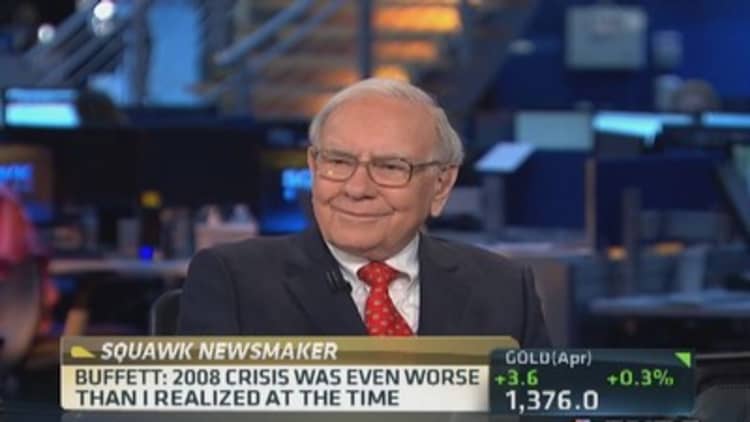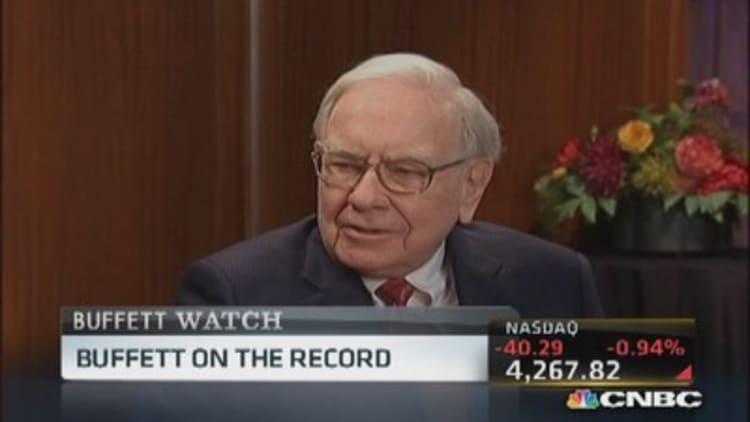Warren Buffett is probably the most famous investor of his generation, and for good reason: His track record over the long term is a thing of beauty.
He has beaten the market by a wide margin over 49 years, a record so impressive that it's used in finance classes as a textbook example of "alpha."
Alpha is an elusive quality. Very simply put, it is the ability to beat an index fund without adding risk to a portfolio. Investment managers are always seeking it. If it exists, Warren Buffett surely has had it.
More from The New York Times:
Young, Rich and Ruling Radio, Country Walks a Broader Line
Vox Takes Melding of Journalism and Technology to a New Level
Ezekiel Emanuel Further Explains His Prediction That Employers Will Drop Health Insurance
A new statistical analysis of Mr. Buffett's long-term record at Berkshire Hathaway has just been done, and it's come up with some fascinating insights about his abilities, past and present, and about the chances that the rest of us have for beating the market. Using a series of statistical measures, the study suggests that Mr. Buffett has indeed been blessed with an impressively big dose of alpha over a very long career.
But it also reveals something that isn't impressive at all: For four of the last five years, Mr. Buffett has been doing worse than the typical, no-frills -stock index fund — so much worse that it's unlikely to be a matter of a string of bad luck. Mr. Buffett has begun to behave like an investor with no alpha at all.

Both sobering facts — Mr. Buffett's long-term outperformance and his recent stretch of mediocrity — appear in high relief in the analysis conducted by Salil Mehta, an independent statistician with deep experience in Washington and on Wall Street. Part of the study appears on his blog, Statistical Ideas, and he shared the rest of it with me, in an elaborate spreadsheet filled with more than 30 pages of data and formulas.
Mr. Mehta, who served as director of analytics in the Treasury Department for the $700 billion Troubled Asset Relief Program, and as director of policy, research and analysis for the Pension Benefit Guaranty Corporation, says Mr. Buffett's record provides some humbling lessons about investment strategies.
"It shows how amazingly difficult it is to keep beating the market, even for a master like Warren Buffett," Mr. Mehta said in an interview. "And it suggests that just about everybody else should just use index funds and not even think about trying to beat the market."
Read MoreWarren Buffett's latest value bet on energy
Mr. Buffett draws the same conclusion about index funds in his recent annual letter to shareholders of Berkshire Hathaway, of which he is chairman. At 83, he writes that he has given the following explicit instructions for the money that he is bequeathing in a trust for his wife: "Put 10 percent of the cash in short-term government bonds and 90 percent in a very low-cost S.&P. 500 index fund. (I suggest Vanguard's.) I believe the trust's long-term results from this policy will be superior to those attained by most investors — whether pension funds, institutions or individuals — who employ high-fee managers."
Mr. Buffett says he has amassed his long-term record by following the precepts of Benjamin Graham, the value investor who was his mentor and professor at Columbia University. Like Mr. Graham, Mr. Buffett says he tries to make investments that will last a lifetime.
Among the forms of active management that Mr. Buffett warns about, he includes high-frequency trading, which is the subject of the new book, "Flash Boys: A Wall Street Revolt," by Michael Lewis. (An excerpt appears in The New York Times Magazine.) But he also says he's prepared to exploit some of the problems induced by "flash traders."
A "flash crash" or another extreme drop in the market won't hurt someone who is a "true investor if he has cash available when prices get far out of line with values," Mr. Buffett says in the letter. "A climate of fear is your friend when investing; a euphoric world is your enemy."

Such precepts, however, don't really explain how Mr. Buffett outperformed the market; if they did, anyone who had read his annual letters could have done it. Mr. Mehta doesn't explain how he did it, either. Instead, Mr. Mehta points out how unusual Mr. Buffett really is. From a statistical standpoint, he is an anomaly.
Consider this, gleaned from Mr. Buffett's own data on the second page of the Berkshire annual report: From the beginning of 1965 through the end of 2013, he outperformed his own chosen benchmark — the S.&P. 500-stock index, including dividends — by 9.9 percentage points, annualized.
How rare is that? According to Mr. Mehta's analysis, it puts Mr. Buffett in a vanishingly small class, comprising far less than 1 percent of the population of investors. This is the tiny group that is statistically likely to have been able to beat the stock market through that elusive alpha — skill of some sort, rather than just chance — over a period of 45 to 50 years.
Read MoreBuffett could buy slice of Cubs, but don't bet on it
The flip side of Mr. Mehta's finding is also worth considering. A vast majority of individuals, including most people now working in finance, do not have alpha, Mr. Mehta says. It doesn't matter whether they have studied finance or have prodigious math skills; the statistics show that they are unlikely to have the ability to beat the market.
That has a serious implication for individual investors, he says: True investing skill is so rare that the rest of us shouldn't even try to emulate those who have it. In addition, he says, we probably shouldn't bother trying to hire the few outperformers to invest our money. Why? Because we aren't likely to be able to identify them. Their talents aren't always on public display, and there may be only a few thousand of them in the entire United States.
Mr. Buffett's talents are widely known. But despite his celebrated past performance, his returns since the beginning of 2009 have been disappointing.
In four of the last five calendar years, he has underperformed his own benchmark, the S.&P. 500 with dividends, often by significant margins. (In 2011, his return of 4.6 percent beat the benchmark by 2.6 percentage points.) In addition, data provided by Morningstar shows that he underperformed the average stock mutual fund investor in four of the five years.)
By contrast, in the previous decades, he had underperformed the S.&P. only six times. Mr. Mehta said his calculations showed that given such a long period of outperformance, there is only a 3 percent chance that the recent stretch of underperformance was a matter of bad luck.
Read MoreWarren Buffett says you should tweet about these
What happened? We don't really know, and Mr. Buffett declined to comment for this column. In a section of the annual report, Mr. Buffett notes that because he judges investments based on what he considers to be their intrinsic value, Berkshire may well underperform in periods when stocks rise rapidly. He also says that as Berkshire has grown, he has increasingly been buying entire operating companies, as opposed to investing in shares of publicly traded companies, and, as a result, the long-term strength of his investments may not be fully reflected in his annual data.
Mr. Mehta won't hazard a guess, but he does compare Mr. Buffett to Michael Jordan, the basketball star. "There were essentially two careers," Mr. Mehta said. "In the first, he was a superstar. And in the second, late in his career, he just wasn't one anymore."
Will Mr. Buffett return to form and trounce the market again? He might or he might not. But Mr. Mehta says that most people will be better off with a draw: anyone can match the market with an index fund.
—By Jeff Sommer of The New York Times

